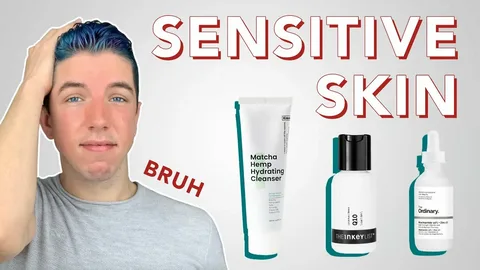Section 1: Outline of the Blog Post
Title: Top 5 Skincare Ingredients to Avoid for Sensitive Skin: Protect Your Glow!
1: Introduction
-
What is sensitive skin?
-
Why knowing your ingredients matters
-
How this guide will help you protect your skin
2: Understanding Sensitive Skin
-
Signs and symptoms of sensitive skin
-
Causes and triggers of skin sensitivity
-
The importance of ingredient awareness
3: Top 5 Skincare Ingredients to Avoid for Sensitive Skin
-
Fragrances (Synthetic and Natural)
-
Why fragrances irritate sensitive skin
-
How to spot fragrance in skincare labels
-
-
Alcohol (Denatured Alcohol, SD Alcohol, Ethanol)
-
Drying and irritating effects
-
Common products that contain alcohol
-
-
Sulfates (SLS, SLES)
-
How sulfates strip skin’s natural oils
-
Where sulfates commonly hide
-
-
Parabens
-
Parabens as preservatives and their effects
-
Controversies and sensitivity concerns
-
-
Essential Oils (Tea Tree, Lavender, Eucalyptus)
-
Natural but potentially irritating
-
Patch testing and alternatives
-
4: How to Read Skincare Labels Like a Pro
-
-
Understanding ingredient lists
-
Spotting hidden irritants
-
What to look for instead
5: Tips for Choosing Skincare Products for Sensitive Skin
-
H3: Look for hypoallergenic and fragrance-free labels
-
H3: Patch testing explained
-
H3: The role of moisturizers and calming ingredients
-
6: Best Skincare Ingredients to Embrace for Sensitive Skin
-
Examples: Niacinamide, Centella Asiatica, Aloe Vera, Ceramides
-
Why these ingredients soothe and protect
7: Common Myths About Sensitive Skin and Skincare Ingredients
-
Myth 1: Natural ingredients are always safe
-
Myth 2: All preservatives are bad
-
Myth 3: Expensive products mean better for sensitive skin
-
8: When to See a Dermatologist
-
H3: Signs your sensitivity needs professional care
-
H3: Treatments and allergy testing
9: Conclusion
-
Recap of the top 5 ingredients to avoid
-
Encouragement to be an informed skincare shopper
-
Reminder: Sensitive skin deserves special care
10: FAQs
-
What are the safest skincare products for delicate skin?
-
Can I use essential oils if I have sensitive skin?
-
How can I tell if a skincare product will irritate my skin?
-
Are “natural” skincare products always better for delicate skin?
-
How often should I patch test new skincare products?
Section 2: Blog Post
Top 5 Skincare Ingredients to Avoid for delicate skin: Protect Your Glow!

Sensitive skin, ever feel like your skin has a mind of its own, flaring up at the slightest touch of a new product? If that sounds familiar, you’re not alone. Sensitive skin is a common condition affecting millions worldwide, and picking the wrong skincare ingredients can turn your glow into an irritation nightmare. But don’t worry — I’m here to help you navigate the confusing world of skincare labels, so you can pamper your skin without the drama.
Ready to find out which five ingredients you should steer clear of to protect your sensitive skin? Let’s dive in!
Understanding Sensitive Skin
Before jumping into what to avoid, let’s understand what sensitive skin really means.
Signs and Symptoms of Sensitive Skin
Sensitive skin often shows up as redness, burning, itching, or dryness after applying certain products or exposure to environmental factors like sun and wind. Sometimes, even gentle cleansers can leave your skin feeling tight or irritated.
Causes and Triggers of Skin Sensitivity
Many things can trigger sensitivity, including genetics, climate changes, allergies, or damaged skin barriers. Often, the culprits are hidden in your skincare — ingredients that are too harsh or irritating for delicate skin.
The Importance of Ingredient Awareness
Knowing what you put on your skin is key. Not all products labeled “gentle” truly are. Being ingredient-savvy saves your skin and your wallet!
Top 5 Skincare Ingredients to Avoid for Sensitive Skin
Here’s the heart of the matter — ingredients that can send your skin into overdrive.

1. Fragrances (Synthetic and Natural)
Why Fragrances Irritate Sensitive Skin
Fragrances are one of the most common causes of skin irritation and allergic reactions. Whether synthetic or natural, they can disrupt your skin barrier and trigger redness or itching.
How to Spot Fragrance in Skincare Labels
Look out for terms like “fragrance,” “parfum,” or “essential oils” (which can be fragrant). Even products labeled “unscented” may contain masking fragrances.
2. Alcohol (Denatured Alcohol, SD Alcohol, Ethanol)
Drying and Irritating Effects
Alcohol is often used to help products absorb faster, but it can strip your skin of natural oils, leading to dryness and irritation — a nightmare for sensitive skin.
Common Products That Contain Alcohol
You’ll find alcohol in toners, astringents, and some sunscreens. Always check labels carefully.
3. Sulfates (SLS, SLES)
How Sulfates Strip Skin’s Natural Oils
Sulfates are foaming agents found in many cleansers and shampoos. While they create satisfying lather, they can aggressively strip oils, disrupting your skin’s moisture balance.
Where Sulfates Commonly Hide
Watch for Sodium Lauryl Sulfate (SLS) or Sodium Laureth Sulfate (SLES) on ingredient lists, especially in cleansers.
4. Parabens
This is a preservative used to extend shelf life. Though generally considered safe in low concentrations, some people with sensitive skin may experience irritation or allergic reactions.
Controversies and Sensitivity Concerns
Due to controversies around hormone disruption, many brands now avoid parabens, making it easier to find paraben-free options.
5. Essential Oils (Tea Tree, Lavender, Eucalyptus)
Natural but Potentially Irritating
Essential oils can be wonderful for many skin types but are concentrated and may cause allergic reactions or irritation on sensitive skin.
Patch Testing and Alternatives
If you want to use essential oils, always dilute them and patch test first. Alternatively, look for calming ingredients without fragrance.
How to Read Skincare Labels Like a Pro
Ingredient lists can look like alphabet soup, but with a little practice, you’ll become a label-reading ninja.
Understanding Ingredient Lists
Ingredients are listed in order of concentration. The first five are the most important. Beware when irritating ingredients appear early on.
Spotting Hidden Irritants
Some irritants hide under tricky names— for example, “parfum” means fragrance, and “alcohol denat.” means denatured alcohol.
What to Look For Instead
Look for “fragrance-free,” “hypoallergenic,” and “non-comedogenic” claims, but always double-check ingredients.
Tips for Choosing Skincare Products for delicate skin
Here’s how to shop smart and safe:
Look for Hypoallergenic and Fragrance-Free Labels
These products are formulated to minimize irritation and allergic reactions.
Patch Testing Explained
Apply a small amount of the product on your inner arm or behind your ear, and wait 24-48 hours to check for reactions before full use.
The Role of Moisturizers and Calming Ingredients
Moisturizers help repair your skin barrier. Look for calming ingredients like ceramides and aloe vera.
Best Skincare Ingredients to Embrace for Sensitive Skin
Switch out irritants for skin-loving heroes.
Examples: Niacinamide, Centella Asiatica, Aloe Vera, Ceramides
These ingredients soothe inflammation, strengthen the skin barrier, and hydrate without irritation.
Why These Ingredients Soothe and Protect
They reduce redness, calm irritation, and help your skin bounce back stronger.
Common Myths About Sensitive Skin and Skincare Ingredients
Let’s bust some myths:
Myth 1: Natural Ingredients Are Always Safe
“Natural” doesn’t always mean gentle. Many natural ingredients can irritate delicate skin.
Myth 2: All Preservatives Are Bad
Preservatives like parabens protect products from bacteria. The key is finding those that don’t irritate your skin.
Myth 3: Expensive Products Mean Better for Sensitive Skin
Price doesn’t guarantee gentleness or effectiveness. Look at ingredients, not price tags.
When to See a Dermatologist
Sometimes, self-care isn’t enough.
Signs Your Sensitivity Needs Professional Care
Severe redness, itching, swelling, or rashes need expert evaluation.
Treatments and Allergy Testing
Dermatologists can perform patch tests and recommend tailored treatments.
Conclusion

Sensitive skin is a delicate dance — it needs care, attention, and the right products. Avoiding the top 5 irritating ingredients—fragrances, alcohols, sulfates, parabens, and certain essential oils—can make a world of difference. Becoming a savvy skincare shopper by reading labels, patch testing, and choosing gentle, soothing ingredients helps protect your skin’s natural glow.
Remember: Your skin deserves kindness and respect. Treat it well, and it will thank you with radiant health.
FAQs
Q1: What are the safest skincare products for sensitive skin?
Look for fragrance-free, hypoallergenic products with calming ingredients like niacinamide, ceramides, and aloe vera. Brands like Cetaphil and La Roche-Posay specialize in sensitive skin formulations.
Q2: Can I use essential oils if I have delicate skin?
Essential oils can irritate sensitive skin. If you want to try them, always dilute properly and perform a patch test. Consider fragrance-free alternatives if irritation occurs.
Q3: How can I tell if a skincare product will irritate my skin?
Check ingredient lists for common irritants like fragrance, alcohol, and sulfates. Always patch test new products on a small skin area before full application.
Q4: Are “natural” skincare products always better for sensitive skin?
Not necessarily. Some natural ingredients can cause allergies or irritation. It’s important to look beyond “natural” labels and check individual ingredients.
Q5: How often should I patch test new skincare products?
Patch test every new product before use, especially if you have delicate skin. Apply a small amount on your inner arm and wait 24-48 hours for any reaction.


